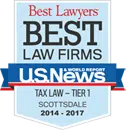Repercussions of Not Filing a Tax Return in Phoenix Repercussions of Not Filing a Tax…
Strategies To Minimize The Risk Of An Arizona Income Tax Audit
The words ‘income tax audit’ strike fear in the hearts of many Arizona residents, sending them scurrying in search of a tax lawyer. The number of Arizona taxpayers that are actually singled out by the Internal Revenue Service for income tax audit is relatively small, but no one wants to find themselves among those who are. While Phoenix tax lawyers tell us there is no guaranteed procedure to avoid an income tax audit, there are some things you can do that may reduce the chances that you will be singled out, such as avoiding some things that raise red flags for the IRS.

Common IRS & State Audit Triggers
While it is a small amount of businesses that are audited by the IRS, there are certain triggers that make it more likely you could be targeted. The IRS audit triggers include:
- High income earners: Those making $200,000+ have a higher chance of being audited. The chance goes up even more for those making $1 million+.
- Unreported Income: The IRS obtains W-2s, 1099s, bank interest forms, and more. They can tell if what you report is different from the documents they have. If there is discrepancy, it could be flagged.
- Excessive Deductions: Claiming substantially large deductions in relation to your income could trigger a need for verification which could trigger an audit. Large deductions could be large charitable donations, medical expenses, or unreimbursed business expenses.
- Reporting Continual Business Losses: If your business is reporting consistent losses, especially if you also have W-2 income, the IRS might want verification that your business is truly a business and not a hobby.
- Cash-Based Business: Owning or working in a restaurant, salon, construction, or vending makes you more susceptible for audits due to the cash-based operation and risk of underreporting.
- Unreported Foreign Income or Crypto Accounts: The IRS has a close eye on those who fail to report foreign income, accounts, or crypto sales. Doing so is a serious IRS audit trigger.
Industry-Specific Audit Risks
There are areas and actions in every industry that make you at higher risk of being audited. Whether you work for a restaurant, in real estate, as a small construction company, as a doctor, or as an independent owner/operator, there are actions that are more likely to trigger audits.
In general, cash-based businesses like restaurants, salons, convenience stores, car washes, laundromats, and food trucks have the highest risk of being audited. The second highest at-risk for audits is in the construction and the contracting industry due to common issues with worker misclassification, under-the-table payments, and more.
Some of the audit risks per industry include:
- Cash-based
- Underreporting of cash income
- Poor recordkeeping
- Real Estate and Rental
- Misclassifying personal use vs. rental use
- Failing to collect Arizona TPT on short-term rentals like Airbnb
- Construction and Contracting
- Large deductions for vehicles, tools, home office
- Underreported income, especially cash payments
- Trucking and Transportation
- Missing mileage logs
- Personal use of company-owned vehicle
- Retail and E-commerce
- Sales tax noncompliance
- Claiming personal items as business inventory
- Agriculture and Farming
- Claiming hobby farms as business
- Improper depreciation of equipment
How To Respond To IRS Or State Audit Notices
If you are notified that your business will be audited by the IRS or the state of Arizona, do not panic. It does not necessarily mean you have done anything wrong. Most audits are triggered by a handful of common red flags, but how you respond can make a big difference. Here are the some key strategies to keep in mind:
Be Truthful
Being completely honest when you file your tax return will definitely reduce the chances of being singled out for an income tax audit. Being less than truthful about your income is asking to be audited. Even leaving out one small account can bring unwanted attention from the IRS. They already have this information from your financial institutions. Do not attempt to hide income or sums of money. In addition, keep documentation to support every business deduction you claim on your income tax return. Taxpayers frequently attempt to pad their business expenses and the IRS is wise to it.
Check Your Math
Another common red flag for the IRS is incorrect data. Mathematical errors are both avoidable and easily corrected. Double check that math. The Internal Revenue Service is unlikely to believe you don’t owe taxes simply because you made a mathematical error. It’s a good idea to use a tax preparation software program or a reputable return preparer to help avoid such errors. Many of these programs also contain an audit risk meter that will check your income tax return for the usual red flags and tell you if your risk is high or low.
Be On Guard For Other Mistakes
Wait for all W-2s and statements from all financial institutions before filing so you don’t inadvertently leave anything out. Don’t forget child support or any other sources of income. Be certain to correctly report your dependents, the IRS will easily pick up on both you and your ex-spouse claiming the same dependents.
Being a Target
Unfortunately, when you file your income tax return as self-employed that puts you in a group often targeted by the IRS. Because being self-employed makes it easier to pad business expenses and to hide income the IRS gives these filings extra attention. Some things that raise extra red flags for the self-employed include reporting business losses for more than three years in a row, and claiming unlikely itemized deductions. Be certain that you understand exactly what constitutes a legitimate deduction. In general, funds spent on the things you need to have or do to make money can be considered deductible. Small business owners should consider hiring a bookkeeper to be certain things are in proper order. There isn’t much you can do about being in a target group. Besides those who are self-employed, other target groups include those with unusually low incomes or above average incomes. In other words, one way to lessen the chances of being scrutinized by the IRS is to blend in.
Neatness Counts
It’s like being back in school, a sloppy, and hard to decipher tax return can draw scrutiny. If at all possible, use a computer to prepare your tax returns. If you don’t have access to a computer, print neatly and legibly. The Internal Revenue Service prefers that your tax returns be prepared on a computer and e-filed. They have found that the rate of errors on paper returns is over 20%, while the rate of errors on computerized returns is less than 1 %.
If You Are Audited
The good news is that a major income tax audit is fairly rare, affecting only 1 to 2% of taxpayers. There are more minor audits, such as a correspondence audit. This is when you receive a notice from the Internal Revenue Service requesting further information about certain data included in your income tax filing. This type of audit is often easily resolved, but if you are feeling anxious it never hurts to retain a tax audit lawyer.
More serious types of audit include an in office audit or a field audit. An in office audit requires you to appear at the IRS office with documentation to prove that the information on your tax return is correct. A field audit usually means that IRS auditors come to your business to inspect your books.
If you are flagged for an in office audit or a field audit, it is wise to contact an experienced Arizona tax lawyer for the audit. Most taxpayers don’t have the knowledge or ability to represent themselves and would be much safer to be represented by an Arizona lawyer for the tax audit. Although unusual, an income tax audit can carry serious repercussions, including criminal charges, so it’s always prudent to seek the counsel of an Arizona tax lawyer.
Audit-Proofing Strategies For High-Income Earners
As a high-income earner, you are more likely to be targeted for an audit. However, there are many tax compliance strategies that you can implement to significantly reduce your chances at being audited. One of the more helpful things you can do for your business in avoiding an audit is to hire a good CPA. Make sure the CPA is licensed and specializes in high-net-worth clients. You should also do the following:
- Keep all your records for at least 7 years
- Avoid red flag deductions
- Use business entities strategically
- Report all income, even if it’s inconvenient to do so
- Review your books before filing
- Be sure there is a legitimate business purpose for deductions
- Accurately report your foreign and crypto income and accounts
- Don’t ignore any IRS letters or state notices
Best Record-Keeping Practices To Protect Your Business
You can implement certain record-keeping practices in your business for audit defense preparation and all-around better workflow. Some helpful practices include:
- Keeping personal and business finances separate
- Using accounting software
- Keep all of your receipts and invoices
- Track mileage and vehicle use
- Carefully track cash transactions
- Keep documentation for all deductions
- Understand how long to keep different types of records
- Reconcile your books every month
- Back up everything regularly
Need Help With An IRS Or State Tax Audit? Schedule Your Confidential Consultation With Silver Law Today
Should you find yourself in need of income tax audit or tax litigation representation, contact us to schedule a confidential consultation. The tax attorneys at Silver Law PLC have over 80 years of experience in virtually every area of tax controversy and litigation, including tax audit representation, audit appeals and both civil and criminal tax litigation. What makes Silver Law PLC unique is that all of our attorneys have previously worked for the Internal Revenue Service as trial attorneys. This gives us a comprehensive understanding of both sides of a tax dispute. We are familiar with how the tax authorities handle different situations and will use our knowledge and expertise to protect your interests.
Whether you’re facing a tax audit or simply want to minimize your audit risk, the experienced Arizona tax attorneys at Silver Law PLC are here to help.

Email: lchapman@silverlawplc.com
Website: taxcontroversy.com
Arizona Location
7033 E. Greenway Pkwy, Ste 200
Scottsdale, AZ 85254
Office:(480) 429-3360
Henderson Location
410 South Rampart Blvd, Suite 390
Las Vegas, Nevada 89145
Office: (702) 801-1000
Las Vegas Location
410 South Rampart Blvd, Suite
390 Las Vegas, Nevada 89145
Office: (702) 726-6819
San Diego Location
7676 Hazard Center Drive, Suite
1525 San Diego, CA 92108
Office: (619) 387-3790
Coronado Location
724 1st St.
Coronado, CA 92118
Office: (619) 612-5337
Utah Location
11576 S. State Street, Suite 1002
Draper, Utah 84020
Office: (801) 340-7514
















Leave a Reply
You must be logged in to post a comment.